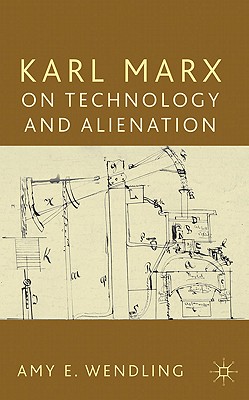Amy E. Wendling: Karl Marx on Technology and Alienation (2009)
Filed under book | Tags: · alienation, capitalism, communism, labour, machine, philosophy, philosophy of technology, revolution, technology, thermodynamics, value, women, work

“In Karl Marx on Technology and Alienation, Amy Wendling draws on lesser known archival materials, including Marx’s notebooks on women and patriarchy and technology to offer a new interpretation of Marx’s concept of alienation as it develops throughout his works. For Marx, technology exemplifies the interaction between human beings and nature. Marx’s description of this interaction is in transition throughout his works. An older, humanist and vitalist paradigm sets the human being against nature as a qualitatively different type of force. A newer, thermodynamic paradigm sets the human being and nature in continuity. Marx’s work occurs at the juncture of these paradigms and contains elements of each. This affects his deployment of the concept ‘labor’. Labor is demoted from its status as a meaningful human activity that confers political status and mastery of the natural world, and it becomes a mere nodal point where energy is transferred. Against this backdrop, Marx increasingly appealed not to meaningful labor but to the abolition of labor as the culmination of human freedom. He also shows how the labours of members of the working class, including women, are interpreted in the old and new paradigms.”
Publisher Palgrave Macmillan, 2009
ISBN 0230224407, 9780230224407
272 pages
Reviews: Chris Arthur (Marx & Philosophy Review of Books, 2010), Richard Cotter (LSE Review of Books, 2013), Tom Bunyard (Historical Materialism, 2014), McKenzie Wark (Public Seminar, 2015).
Comment (0)Nick Land: Fanged Noumena: Collected Writings 1987-2007 (2011)
Filed under book | Tags: · biology, capitalism, cryptography, geophysics, nihilism, occultism, philosophy

“Fanged Noumena brings together the writings of Nick Land for the first time. During the 1990s Land’s unique philosophical work, variously described as ‘rabid nihilism’, ‘mad black deleuzianism’ and ‘cybergothic’, developed perhaps the only rigorous and culturally-engaged escape route out of the malaise of ‘continental philosophy’ – a route which was implacably blocked by the academy. However, Land’s work has continued to exert an influence, both through the British ‘speculative realist’ philosophers who studied with him, and through the many cultural producers – artists, musicians, filmmakers, bloggers – who have been invigorated by his uncompromising and abrasive philosophical vision.
Beginning with Land’s early radical rereadings of Heidegger, Nietzsche, Kant and Bataille, the volume then collects together the papers, talks and articles of the mid-90s – long the subject of rumour and vague legend (including some work which has never previously appeared in print) – in which Land developed his futuristic theory-fiction of cybercapitalism gone amok; and ends with his enigmatic later writings in which Ballardian fictions, poetics, cryptography, anthropology, grammatology and the occult are smeared into unrecognisable hybrids.
Fanged Noumena allows a dizzying perspective on the entire trajectory of this provocative and influential thinker’s work, and will introduce his unique voice to a new generation of readers.”
Edited by Robin Mackay, Ray Brassier
Publisher Urbanomic, Falmouth/UK; with Sequence Press, New York, 2011
Second edition, 2012
ISBN 095530878X, 9780955308789
667 pages
Review: Mark Fisher.
PDF (removed on 2013-3-13 upon request of the publisher)
Comment (0)Maurizio Lazzarato: The Making of the Indebted Man: An Essay on the Neoliberal Condition (2011–) [French, English]
Filed under book | Tags: · capitalism, debt, economics, money, neoliberalism, philosophy

“‘Debt—both public debt and private debt—has become a major concern of economic and political leaders. In The Making of the Indebted Man, Maurizio Lazzarato shows that, far from being a threat to the capitalist economy, debt lies at the very core of the neoliberal project. Through a reading of Karl Marx’s lesser-known youthful writings on John Mill, and a rereading of writings by Friedrich Nietzsche, Gilles Deleuze, Félix Guattari, and Michel Foucault, Lazzarato demonstrates that debt is above all a political construction, and that the creditor/debtor relation is the fundamental social relation of Western societies.
Debt cannot be reduced to a simple economic mechanism, for it is also a technique of “public safety” through which individual and collective subjectivities are governed and controlled. Its aim is to minimize the uncertainty of the time and behavior of the governed. We are forever sinking further into debt to the State, to private insurance, and, on a more general level, to corporations. To insure that we honor our debts, we are at once encouraged and compelled to become the “entrepreneurs” of our lives, of our “human capital.” In this way, our entire material, psychological, and affective horizon is upended and reconfigured.
How do we extricate ourselves from this impossible situation? How do we escape the neoliberal condition of the indebted man? Lazzarato argues that we will have to recognize that there is no simple technical, economic, or financial solution. We must instead radically challenge the fundamental social relation structuring capitalism: the system of debt.”
French edition
Publisher Éditions Amsterdam, 2011
125 pages
English edition
Translated by Joshua David Jordan
Publisher Semiotext(e), 2012
Intervention series, 13
ISBN 1584351152, 9781584351153
199 pages
Review: Nikolay Karkov (Canadian Society for Continental Philosophy, 2012).
Publisher (EN)
La Fabrique de l’homme endetté. Essai sur la condition néolibérale (French, 2011, updated on 2016-12-23)
The Making of the Indebted Man: An Essay on the Neoliberal Condition (English, 2012, updated on 2017-6-26)

